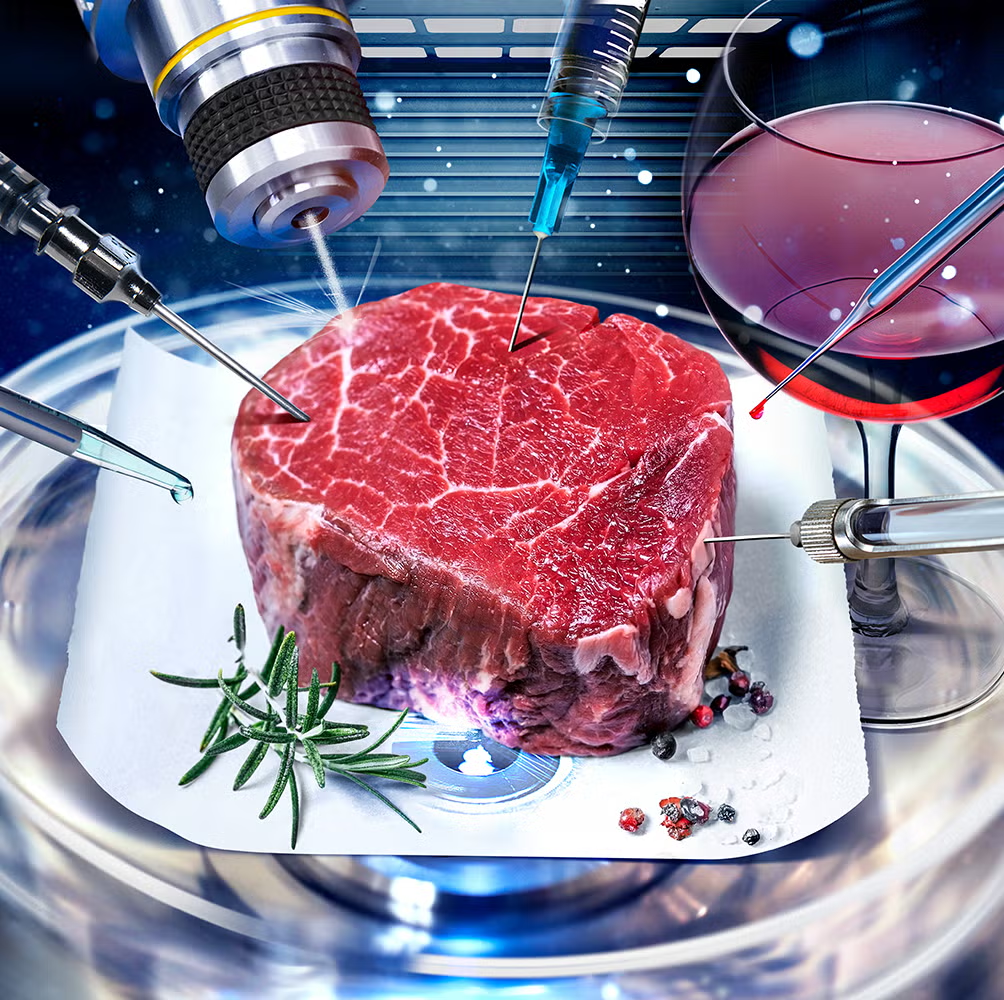Picture this: It’s Sunday, and you’re serving up a delicious roast dinner—except your beef never saw a pasture, your cheese was never milked from a cow, and your sugar comes from a lab instead of a cane field. Sounds futuristic? Well, this scenario could be reality in the UK within the next two years.
Lab-grown foods—including meat, dairy, and sugar—are on the brink of a breakthrough in the UK market, pending regulatory approval. This revolutionary approach to food production promises a future where we can enjoy our favorite meals without the guilt of environmental impact or animal cruelty. But the big question remains: Are Brits ready to swap their traditional roasts for steaks grown in a lab?
The Race for Regulatory Approval
The Food Standards Agency (FSA) is fast-tracking its approval processes for lab-grown products to help UK startups catch up with global leaders in Singapore, Israel, and the US. Historically, Britain has been at the cutting edge of food technology, but lengthy regulatory delays have forced homegrown innovators to play catch-up.
In response, the FSA is collaborating closely with industry experts and academic researchers to create a “pro-innovation” regulatory framework. The aim? Ensuring rigorous safety standards while reducing approval times. However, skeptics caution that industry involvement in shaping these regulations might risk compromising safety—like asking the foxes to design the henhouse’s security system.
From Lab to Plate: The Science Explained

How exactly do you grow food in a lab? It’s simpler (and stranger) than it sounds. Scientists cultivate animal or plant cells in controlled environments like fermentation tanks and bioreactors. Sometimes, gene editing is involved to enhance taste, texture, or nutritional value. The goal is clear: ethically produced food that tastes as good as the real thing but leaves behind a much smaller environmental footprint.
Some exciting UK-based startups leading this food revolution include:
- Ivy Farm Technologies (Oxford): Offering Wagyu and Aberdeen Angus beef cultivated directly from cow cells. Imagine savoring a juicy steak that never required a cow to “take one for the team.”
- MadeSweetly (London): Creating a berry-based sugar alternative that is healthier than traditional sweeteners—finally, a sweet treat without the bitter aftertaste of regret!
Navigating the Regulatory Maze and Global Competition
The UK government is keen on the economic opportunities offered by lab-grown foods—jobs, innovation, and sustainability. Yet, the current approval timeline of up to two years lags far behind countries like Singapore, which first approved lab-grown meat back in 2020.
However, acceptance isn’t universal: Italy and some regions in the US, like Alabama and Florida, have banned lab-grown meat altogether, wary of sliding down a slippery slope toward meals made entirely from test tubes and beakers.
Benefits and Concerns: A Balanced Bite
Advocates of lab-grown food highlight impressive potential benefits: drastically reduced greenhouse gas emissions, elimination of animal cruelty, and significantly lower use of land and water.
But critics point to lingering doubts. Lab-grown foods, despite their eco-friendly image, still demand significant energy inputs and typically qualify as ultra-processed products—something health experts have increasingly warned against.
Pat Thomas, director at Beyond GM, voices a common concern: “We’re trying to reduce ultra-processed foods in our diets, yet these new products push us further in that direction.” In other words, are we ready to trade our natural diets for something cooked up in a lab?
The Countdown to Change
The FSA plans to fully assess the safety of at least two lab-grown foods within the next two years, while continuously improving the approval process. By 2027, supermarket aisles and restaurant menus across Britain could feature these revolutionary food items.
The question isn’t if this technology will arrive, but whether British consumers will embrace it—or politely decline and stick to their traditional favorites. One thing is clear: the future of food is changing rapidly, and Brits must decide whether to dive in or simply stick to fish and chips.
Here are five notable companies pioneering lab-grown meat and other food technology, along with insights into their financial standings:
- Tyson Foods, Inc.
- Overview: Tyson Foods is a major player in the global meat industry, producing approximately 20% of the meat consumed in the United States. Recognizing the potential of alternative proteins, Tyson has invested in lab-grown meat ventures such as Future Meat Technologies and Upside Foods through its venture capital arm, Tyson Ventures.Securities.io
- Financials: As of 2022, Tyson Foods reported revenues of $53 billion and a net income of $3.4 billion, positioning it as a financially robust entity capable of supporting and integrating innovative food technologies.
- Overview: Tyson Foods is a major player in the global meat industry, producing approximately 20% of the meat consumed in the United States. Recognizing the potential of alternative proteins, Tyson has invested in lab-grown meat ventures such as Future Meat Technologies and Upside Foods through its venture capital arm, Tyson Ventures.Securities.io
- JBS S.A.
- Overview: Headquartered in Brazil, JBS is one of the world’s largest meat processing companies. In 2021, JBS invested $100 million to acquire Spanish startup BioTech Foods and establish an R&D center in Brazil, aiming to advance its capabilities in cultured meat production.
- Financials: JBS has a market capitalization of approximately $7.8 billion. Its strategic investments in alternative proteins reflect a commitment to diversifying its product offerings in response to evolving consumer preferences.
- Overview: Headquartered in Brazil, JBS is one of the world’s largest meat processing companies. In 2021, JBS invested $100 million to acquire Spanish startup BioTech Foods and establish an R&D center in Brazil, aiming to advance its capabilities in cultured meat production.
- Agronomics Limited
- Overview: Agronomics is a venture capital firm specializing in cellular agriculture, including lab-grown meat, dairy, and other alternative proteins. Its diversified portfolio encompasses various startups in the cultured meat space, providing investors with broad exposure to this emerging industry.
- Financials: Since its inception in 2018, Agronomics has achieved a gross internal rate of return (IRR) of 23%, demonstrating effective investment strategies in the alternative protein sector.
- Overview: Agronomics is a venture capital firm specializing in cellular agriculture, including lab-grown meat, dairy, and other alternative proteins. Its diversified portfolio encompasses various startups in the cultured meat space, providing investors with broad exposure to this emerging industry.
- Steakholder Foods Ltd.
- Overview: Formerly known as MeaTech 3D Ltd., Steakholder Foods focuses on developing 3D bioprinting technology to produce cultured meat products that replicate the texture and flavor of traditional meat. The company operates in Israel, Belgium, and the USA.
- Financials: As of the third quarter of 2022, Steakholder Foods held $11 million in cash, with a quarterly loss of $2.5 million. The company has raised a total of $54 million to date and is publicly traded on NASDAQ under the ticker STKH.
- Overview: Formerly known as MeaTech 3D Ltd., Steakholder Foods focuses on developing 3D bioprinting technology to produce cultured meat products that replicate the texture and flavor of traditional meat. The company operates in Israel, Belgium, and the USA.
- Mosa Meat
- Overview: Based in the Netherlands, Mosa Meat is renowned for creating the world’s first lab-grown hamburger in 2013. The company focuses on developing cultured beef products and has opened a 30,000-square-foot facility to scale up production.
- Financials: Specific financial details are not publicly disclosed. However, Mosa Meat has attracted significant investment, including a $35 million Series B funding round in 2023, indicating strong investor confidence in its technology and market potential. The Good Food Institute
- Overview: Based in the Netherlands, Mosa Meat is renowned for creating the world’s first lab-grown hamburger in 2013. The company focuses on developing cultured beef products and has opened a 30,000-square-foot facility to scale up production.
These companies exemplify the dynamic landscape of the lab-grown meat industry, each contributing unique innovations and strategic investments to drive the future of sustainable protein sources.
Key Takeaways:
- Lab-grown meat, dairy, and sugar could arrive in the UK by 2027.
- The FSA is speeding up approval processes to catch up with global competitors.
- UK startups Ivy Farm and MadeSweetly are innovating but face regulatory delays.
- Concerns remain around health impacts, energy use, and potential conflicts of interest.
- Lab-grown food promises significant sustainability benefits—but will consumers bite?
Would you give lab-grown food a chance, or are traditional meals too good to leave behind? Share your thoughts below!


0 Comments